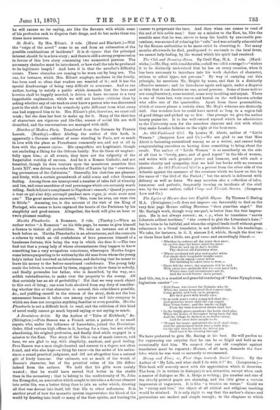The Lyrics of Horace done into English Rhyme. By Thomas
C. Baring M.A. (Rivingtons.)—It does not impress one favourably to find on the very first page Horace calling Mteconas " thou guardian angel." But Mr. Baring's work, though very unequal, is better than the first impres- sion. He is not always correct ; as, e. g., when ho translates "saevis Liburnis scilicet invidens," " she scorned to glut the Liburnian's hate ;" but he tries to be faithful, and when the original lends itself without great reluctance to a literal translator, is not infelicitous in his renderings. We take, for instance, in ii. 3, stanzas 2-4, which, though the first two or three lines halt a little, are good verse and exceedingly literal:— "Whether in sadness all thy years thou pass; Or on filte-days far hence amid the grass Thou lie, and sip at day's decline Thy choicest old Falerulan wine,
" Where overhead tall pine and poplar white For shade their hospitable boughs unite, And in its zigzag course below The babbling brooklet tries to flow,— " There bid thy wines, thy unguents rich be laid, With sweet rose garlands that too soon must fade, Whilst Limo and circumstance are lit, And the weird Sisters' skein permit.
And this, too, is a musical and graceful rendering of " Faune Nympliarum, fugientum amator":-
Bold
Faun, who lovost the Nymphs who fly When my sunny homestead thou commit nigh, Come gently, and look on its progeny, Ere thou goest with kindly eyes.
"So at each year's end a young kid shall die ; And generous wines shall the cup supply That Venus loves; and the smoke on high
From thy time-honoured shrine shall rise.
" In the bright green meadows the herds shall play, When the Nonce of December bring back thy day, And the village he decked in its festive array, And the oxen have naught to do.
llongst the lambs unfrighted the wolf shall stray ; And the greensward strew thee a leafy way ; On the turf that he hateth the delver gay Shall foot it the evening through:*
We have preferred to give Mr. Baring at his best. He will pardon us for expressing our surprise that he can be so frigid and bald as we occasionally find him. We suspect that our old complaint against translators must be repeated ; Horace, of all men, domande the limn labor which he was wont so earnestly to recommend.






























 Previous page
Previous page